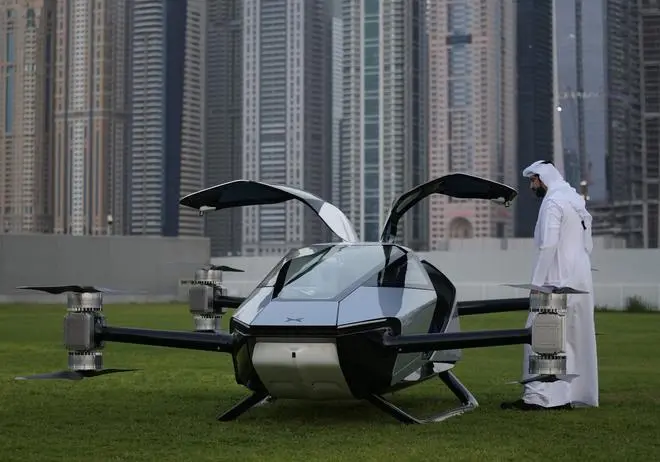A Chinese firm tested out an electric flying taxi in Dubai on Monday, offering a glimpse of futuristic technology that could one day whisk people through cities high above any traffic.
The XPeng X2, developed by the Guangzhou-based XPeng Inc's aviation affiliate, is one of dozens of flying car projects around the world. Only a handful have been successfully tested with passengers on board, and it will likely be many years before any are put into service.

A man looks at the XPeng X2, an electric flying taxi developed by the Guangzhou-based XPeng, Inc’s aviation affiliate, being tested in front of the Marina District in Dubai, United Arab Emirates, Monday, Oct. 10, 2022. | Photo Credit: Kamran Jebreili
Monday's demonstration was held with an empty cockpit, but the company says it carried out a manned flight test in July 2021.
The sleekly designed vehicle can carry two passengers and is powered by a set of eight propellers. The company says it has a top speed of 130 km (80 miles) per hour.
XPeng’s eVTOL flying car X2 makes its first public flying in Dubai, United Arab Emirates, October 10, 2022. | Photo Credit: Reuters
Unlike airplanes and helicopters, eVTOL, or “electric vertical takeoff and landing,” vehicles offer quick point-to-point personal travel, at least in principle.
Two XPeng eVTOL flying cars X2 sit on the ground in Dubai, United Arab Emirates, October 10, 2022. | Photo Credit: REUTERS
The pilot-less vehicles could one day ferry passengers across town high above congested roadways. But the sector still faces major challenges, including battery life, air traffic control and safety, and infrastructure issues.




Comments
Comments have to be in English, and in full sentences. They cannot be abusive or personal. Please abide by our community guidelines for posting your comments.
We have migrated to a new commenting platform. If you are already a registered user of TheHindu Businessline and logged in, you may continue to engage with our articles. If you do not have an account please register and login to post comments. Users can access their older comments by logging into their accounts on Vuukle.